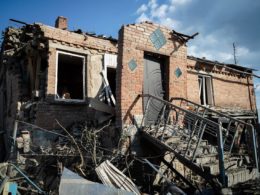A US proposal for using future interest on some $300 billion in frozen Russian assets to aid Ukraine, instead of seizing them outright, is gaining momentum among the Group of Seven nations, two G7 officials said, Reuters has reported.
The approval of the $61 billion aid bill by the US and a separate €50 billion package from the European Union would help Ukraine, but it still faces uncertainties over funding in 2025 and 2026.
The US currently maintains its stance that all possibilities, including the direct confiscation of Russian assets, are legally justified and should be considered. However, the official explained that it is keen to rally support for an idea that could provide immediate assistance to Ukraine.
One of the top ideas for solving the differences between the US and Europe before the G7 summit is to use the interest earned on Russia's frozen assets, which could be around $5 billion annually.
However, there's still debate among G7 members about some "holdbacks" that might reduce these profits to $2.5-$3.0 billion. These include Belgium's 25% tax rate, a "convenience fee" charged by Euroclear, and a proposed litigation reserve.
The officials said G7 finance ministers will discuss the matter again in late May, aiming to reach an agreement to present to leaders during the June summit.
"We feel a sense of urgency to build international consensus. Everyone acknowledges that we need to do more,” said the official.
Another G7 official repeated that position, emphasizing the need to ensure a longer-term funding stream for Ukraine.
Opting for a loan instead of issuing a bond seems a logical decision because it wouldn't necessitate formal issuance procedures with a prospectus, enabling sovereign nations to respond swiftly. Additionally, it would permit G7 nations to offer further assistance to Ukraine at a comparatively low expense.
Washington's shift towards prioritizing interest from the assets follows opposition from France, Germany, and the European Central Bank regarding the proposal to confiscate the assets. They are concerned that the euro could be impacted if other nations, like China, begin repatriating their reserves as a precaution against potential confiscation in the future.
"One big advantage of the loan idea from the European perspective is that it's entirely focused on the windfall proceeds. You're just taking the proceeds that Europe has already determined are not owned by Russia, and you're bringing them forward. Not only is there no direct seizure, but there's also no threat of seizure," the first G7 official said.
Brad Setser, a senior fellow at the Council on Foreign Relations, noted that Washington was evidently seeking a compromise, and expediting the expected interest income could be a plausible foundation for reaching an agreement in two months.
"It's a very reasonable approach and has limited legal risks," he said, noting that G7 countries had pledged to keep the Russian assets frozen until Moscow pulled its forces out of Ukraine and paid for the damages caused by the invasion.
There's no evidence that Russia is leaving, so that means the income stream will be available for a long period of time,” said the expert.
This month, the Parliamentary Assembly of the Council of Europe unanimously adopted a resolution supporting the reconstruction of Ukraine.
PACE adopts resolution to use Russian assets for Ukraine’s reconstruction
The document, backed by all 134 participants at the meeting, focuses on transferring frozen Russian assets to an international compensation fund designated to restore Ukraine’s damaged infrastructure.
Read also:
- PACE adopts resolution to use Russian assets for Ukraine’s reconstruction
- FT: US proposes debt to fund Ukraine using profits from Russian assets
- Politico: EU retains €5 billion Russian frozen asset profits, blocks transfer to Ukraine





